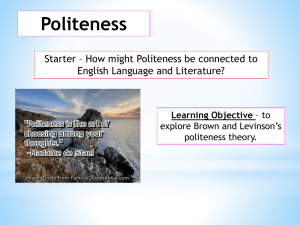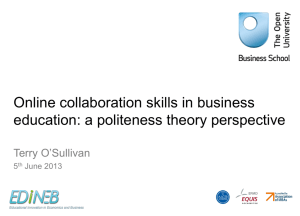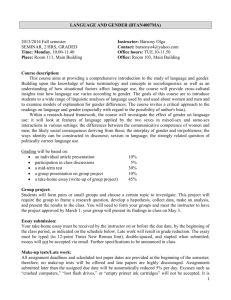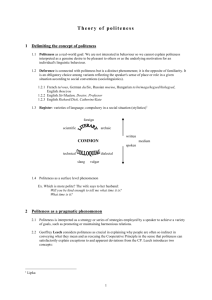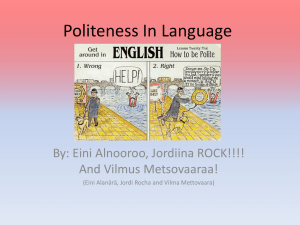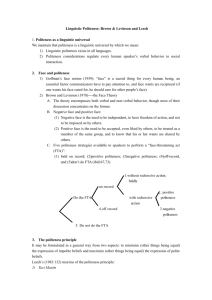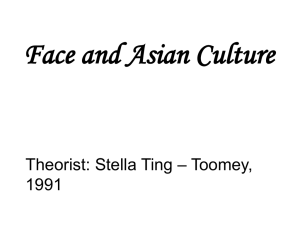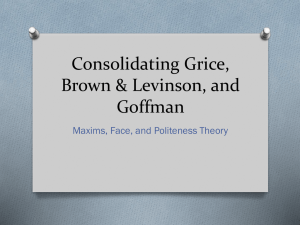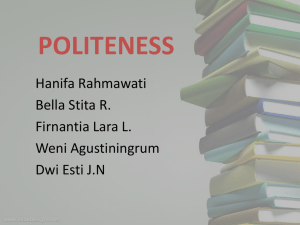Topic 12 - Lancaster University
advertisement
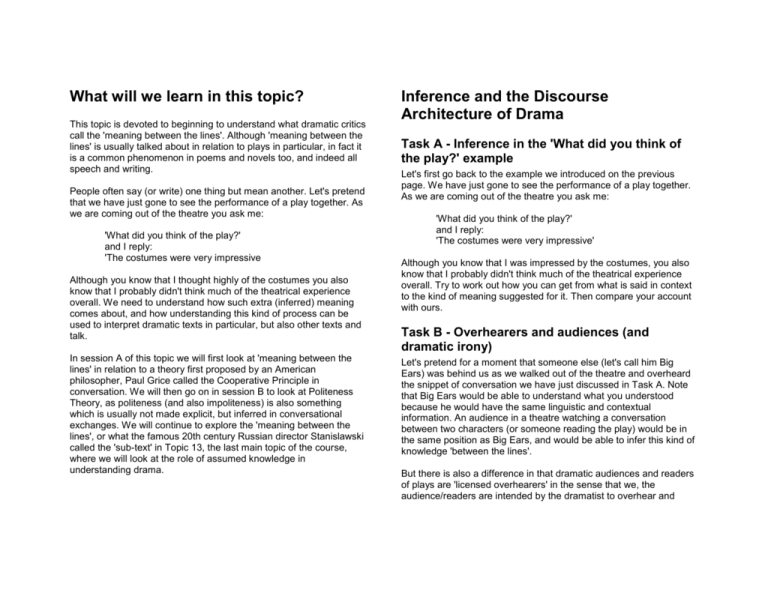
What will we learn in this topic? This topic is devoted to beginning to understand what dramatic critics call the 'meaning between the lines'. Although 'meaning between the lines' is usually talked about in relation to plays in particular, in fact it is a common phenomenon in poems and novels too, and indeed all speech and writing. People often say (or write) one thing but mean another. Let's pretend that we have just gone to see the performance of a play together. As we are coming out of the theatre you ask me: 'What did you think of the play?' and I reply: 'The costumes were very impressive Although you know that I thought highly of the costumes you also know that I probably didn't think much of the theatrical experience overall. We need to understand how such extra (inferred) meaning comes about, and how understanding this kind of process can be used to interpret dramatic texts in particular, but also other texts and talk. In session A of this topic we will first look at 'meaning between the lines' in relation to a theory first proposed by an American philosopher, Paul Grice called the Cooperative Principle in conversation. We will then go on in session B to look at Politeness Theory, as politeness (and also impoliteness) is also something which is usually not made explicit, but inferred in conversational exchanges. We will continue to explore the 'meaning between the lines', or what the famous 20th century Russian director Stanislawski called the 'sub-text' in Topic 13, the last main topic of the course, where we will look at the role of assumed knowledge in understanding drama. Inference and the Discourse Architecture of Drama Task A - Inference in the 'What did you think of the play?' example Let's first go back to the example we introduced on the previous page. We have just gone to see the performance of a play together. As we are coming out of the theatre you ask me: 'What did you think of the play?' and I reply: 'The costumes were very impressive' Although you know that I was impressed by the costumes, you also know that I probably didn't think much of the theatrical experience overall. Try to work out how you can get from what is said in context to the kind of meaning suggested for it. Then compare your account with ours. Task B - Overhearers and audiences (and dramatic irony) Let's pretend for a moment that someone else (let's call him Big Ears) was behind us as we walked out of the theatre and overheard the snippet of conversation we have just discussed in Task A. Note that Big Ears would be able to understand what you understood because he would have the same linguistic and contextual information. An audience in a theatre watching a conversation between two characters (or someone reading the play) would be in the same position as Big Ears, and would be able to infer this kind of knowledge 'between the lines'. But there is also a difference in that dramatic audiences and readers of plays are 'licensed overhearers' in the sense that we, the audience/readers are intended by the dramatist to overhear and understand what is going on when the characters talk to one another. This follows from the 'doubled discourse' nature of drama that we explored in Task B of the 'Analysing drama - preliminary matters' page in Topic 11. Using the doubled discourse architecture of drama, explain what the audience knows at the end of Algernon's second speech, how this is different from what Lady Bracknell knows, and what it tells the audience about Algernon. So far we have assumed that the audience and the characters on stage will be able to infer the same knowledge. But the doubled discourse structure of drama also enables a playwright to communicate additional things to the audience/reader, which some, or all, of the characters will not know. It is this use of the discourse architecture of drama that leads to what critics call dramatic irony'. Grice's Cooperative Principle We will use as an example a speech by Algernon, a 19th century upper class layabout, to his aunt, Lady Bracknell, from near the beginning of Oscar Wilde's The Importance of Being Earnest. Algernon has just told his friend Jack that he has invented another friend, called Bunbury. Whenever Algernon wants to get out of a social engagement he conveniently pretends that Bunbury is ill, and that he must visit him. Then, a little later, Lady Bracknell arrives and reminds him that he is invited to dinner with her that evening: Algernon: I am afraid, Aunt Augusta, I shall have to give up the pleasure of dining with you tonight after all. Lady Bracknell: (frowning) I hope not, Algernon. It would put my table completely out. Your uncle would have to dine upstairs. Fortunately he is accustomed to that. Algernon: It is a great bore, and, I need hardly say, a terrible disappointment to me, but the fact is that I have just had a telegram to say that my poor friend Bunbury is very ill again. (Exchanges glances with Jack.) They seem to think I should be with him. (Oscar Wilde, The Importance of Being Earnest, Act 1) Task A - What is Grice's Cooperative Principle in Conversation? We will use Paul Grice's (1975) influential 'Cooperative Principle' approach to describe how we infer unstated meanings in ordinary conversations and apply this to dramatic conversations. Your role in this task is to read and understand. Then, in subsequent tasks we will apply Gricean analysis to a series of brief examples to help you understand how to apply Gricean analysis. Conversational cooperation Grice says that when we communicate we assume, without realising it, that we, and the people we are talking to, will be conversationally cooperative - we will cooperate to achieve mutual conversational ends. This conversational cooperation even works when we are not being cooperative socially. So, for example, we can be arguing with one another angrily and yet we will still cooperate quite a lot conversationally to achieve the argument. This conversational cooperation manifests itself, according to Grice, in a number of conversational MAXIMS, as he calls them, which we feel the need to abide by. These maxims look at first sight like rules, but they appear to be broken more often than grammatical or phonological rules are, for example, as we will see later, and this is why Grice uses the term 'maxim' rather than 'rule'. Here are the four maxims (there may well be more) which Grice says we all try to adhere to in conversation. You can click on each one and get an explanatory comment: The conversational maxims Maxim of quantity (quantity of information) Give the most helpful amount of information. This maxim is a bit like the temperature of baby bear's porridge in Goldilocks and the Three Bears - not too much, not too little, but just right! You may often feel that we are guilty of giving you too much information on this website. But we are trying to be helpful, honest! Maxim of quality (quality of information) Do not say what you believe to be false. It may seem at first sight that it would be simpler for this maxim to be 'Tell the truth'. But it is often difficult to be sure about what is true, and so Grice formulates this maxim in a way that, although it looks more complicated, is actually easier to follow. Evidence of the strength of this maxim is that most people find it difficult to lie when asked a direct question, and we tend to believe what people tell us without thinking, especially if it is written down (presumably because writers normally have more time than speakers to consider carefully what they say). Maxim of relation Be relevant. Note that if you join a conversation you can't just begin to talk about whatever you like. You have to connect what you want to say (make it relevant) to what is already being talked about. For example if everyone else is talking about their holidays and you want to talk about Spain, you'll need to connect the two topics together with a remark like 'I went on holiday to Spain last year . . .' Similarly, if, in an exam, you write an essay on a topic slightly different from the question asked you are likely to lose marks. Maxim of manner Put what you say in the clearest, briefest, and most orderly manner. Good evidence for this maxim is what you get penalised for when you write essays. If your are vague or ambiguous (i.e. not clear) you can lose marks; if you are over-wordy you can lose marks (readers don't like having to read extra words when they don't have to); if you do not present what you say in the most sensible order for your argument you can lose marks. And although you don't lose marks in conversation, you can lose friends if you do not abide by these maxims. Breaking the maxims We have already pointed out that the conversational maxims are broken rather more often than lingustic rules (e.g. in grammar). We can break the conversational maxims in two main ways: We can VIOLATE them This means that we break the maxims surreptitiously, or covertly, so that other people do not know. If we violate the maxim of quality, we lie. If we violate the maxim of quantity by not giving enough information, if someone finds out we can be accused of 'being economical with the truth', another deceit. If you like, violating the maxims amounts to breaking them 'illegally', just as people who steal are guilty of laws concerning theft. As with laws, some maxim violations can be more more heinous than others. Lying in a court of law is disapproved, but 'white lies', small lies to keep the social peace, are often thought as acceptable. We can FLOUT them If we FLOUT a maxim, we break it in a FLAGRANT (and often foregrounded) way, so that it is obvious to all concerned that it has been broken. If this happens, then it is clear that the speaker is intending the hearer to infer some extra meaning over and above what is said (evidence for this is that people of say things like 'He said he was happy, but the way he said it implied he wasn't really'. Grice distinguishes what he calls 'sentence meaning' from 'utterer's meaning' and he refers to an utterer's meaning indicated through a flout as an IMPLICATURE. So the implicature is what we have been referring to so far as the 'extra meaning'. Re-examining the examples we have already looked at It is the flouting of maxims which constitute their 'extra-breaking' character, as compared with linguistic rules. Essentially maximflouting is conversationally cooperative because all the participants in the conversation can see that a maxim has been broken on purpose by the speaker or writer in order to create an extra layer of meaning which is accessible by inference. In the following tasks we will look again at the two examples we have already considered on the 'Inference and the discourse architecture of drama' page. In each case when we analyse a text or discourse we will need to consider (1) what maxim(s) have been broken, (2) whether the break constitutes a violation or a flout and (3) what implicature, if any, arises as a result of the break. Of course we have already covered (3) in the answers to the exercises on the 'Inference and the discourse architecture of drama' page, so we don't need to go through that again in any detail. Reference Grice, H. P. (1975) 'Logic and conversation'. In P. Cole and J. Morgan (eds) Studies in Syntax and Semantics III: Speech Acts, New York: Academic Press, pp. 183-98. Task B - Coming out of the theatre again Here is the text again, and below it we have provided a link to our discussion of our understanding of it. You need to decide (1) what maxim(s) have been broken, (2) whether the break constitutes a violation or a flout and what the general interpretative consequences are: We have just gone to see the performance of a play together. As we are coming out of the theatre you ask me: 'What did you think of the play?' and I reply: 'The costumes were very impressive' You can look back at our answer to Task A on the 'Inference and the discourse architecture of drama' page. Task C - The Importance of Being Earnest again As with the previous task, you need to decide for Algernon's final speech in the extract below (1) what maxim(s) have been broken, (2) whether the break constitutes a violation or a flout and what the general interpretative consequences are: [Context: Algernon has just told his friend Jack that he has invented another friend, called Bunbury. Whenever Algernon wants to get out of a social engagement he conveniently pretends that Bunbury is ill, and that he must visit him. Then, a little later, Lady Bracknell arrives and reminds him that he is invited to dinner with her that evening.] Algernon: I am afraid, Aunt Augusta, I shall have to give up the pleasure of dining with you tonight after all. Lady Bracknell: (frowning) I hope not, Algernon. It would put my table completely out. Your uncle would have to dine upstairs. Fortunately he is accustomed to that. Algernon: It is a great bore, and, I need hardly say, a terrible disappointment to me, but the fact is that I have just had a telegram to say that my poor friend Bunbury is very ill again. (Exchanges glances with Jack.) They seem to think I should be with him. (Oscar Wilde, The Importance of Being Earnest, Act 1) Task A - Kate is nice Two students, A and B are talking about two other students. What Gricean maxim does B flout, and what is the implicature that follows from the flout? A: Do you like John and Kate? B: Kate is fun. Task B - 'I've got a meeting at 3.30' Two married university lecturers are talking about who is going to get the children from school. What maxim does B flout and what implicature follows from it? A: Who is picking up the children today? B: I've got a meeting at 3.30. Task C - Wild Thing Below are the first two lines of the song 'Wild Thing' by the song writer Chip Taylor. 'Wild Thing' became a hit record for a group called The Troggs in 1966. What maxim is flouted in line 2 and what implicature follows? Wild thing You make my heart sing Task D - 'He's not the politest person I've met' You ask a friend what he thinks of a lecturer who has a reputation for being sarcastic.What maxim is flouted, and what implicature is produced in the following reply? He's not the politest person I've met. Task E - The return of a Shakespearean example We first came across the following two lines in Task C of the 'Analysing drama - preliminary matters' page in Topic 11. You may find it helpful to remind yourself of what we discovered in that task before completing this one. There are a number of maxims flouted in these two lines. Try to identify them all, the implicatures which result from each flout, and how they contribute to the overall effect. FALSTAFF: My King! My Jove! I speak to thee, my heart! KING: I know thee not, old man. Fall to thy prayers. Task F - A bit more information about how the Gricean maxims operate The examples we have looked at so far have been small-scale and designed to help you spot individual maxims being flouted and infer what is implicated in context. But it is important to remember that in real-life examples things might be a bit more complex: 1. The examples we have looked at so far have tended to be short sentences/utterances. But the domain over which a maxim might operate can be shorter than a sentence/utterance and sometimes longer than a sentence. 2. One utterance or stretch of text might break more than one maxim at the same time. 3. One maxim might be broken in order to preserve another (for example you might break the manner maxim to avoid saying something you think is untrue, and so uphold the quality maxim). 4. Similarly, a maxim might be broken in order to preserve politeness (indeed, Grice himself suggested politeness as another possible candidate for being a conversational maxim). We will examine politeness as a separate phenomenon in session B. 5. When an implicature that follows from the flouting of a maxim is spelled out, there is bound to be some variation between one person's account and another's because different people are bound to choose different words and grammatical structures. This is bound to result in some interpretative variability. But it is also important to note that the variability will usually be within a rather narrow range. Top Girls 8. LOUISE: 9. WIN: On this page we are going to look at an extract from Top Girls by Caryl Churchill, and use the Gricean analysis we have been learning about in this topic to explore the 'meaning between the lines' in the conversation- the unstated but nonetheless understood meanings, character attitudes etc. that we can perceive 'behind' or 'underneath' what is said. We won't look at every single turn because that would take too long. But by the time you finish the tasks on this page you should be able to see how you can use Gricean, and other forms of analysis, on all turns and turn-combinations in a text to build up an analytical picture of what is going on in it in interpretative terms. Task A - Initial engagement with the text Read the text below and then watch the videoclip performance. After you feel you have come to terms with the extract, write down what you feel, in general terms, is the 'subtext' of the relationship between the characters Win and Louise. What feelings and attitudes come through what is said? [Context: Win works as an adviser at the Top Girls employment agency, helping people find employment. Louise has come to the agency for help, and this is the first meeting between the two women.] 1. WIN: 2. LOUISE: 3. WIN: 4. LOUISE: 5. WIN: 6. LOUISE: 7. WIN: Now, Louise, hello. I have your details here. You’ve been very loyal to the one job I see. Yes I have. Twenty years is a long time in one place. I feel it is. I feel it’s time to move on. And you are what age now? I’m in my early forties. Exactly? 10. LOUISE: 11. WIN: 12. LOUISE: 13. WIN: 14. LOUISE: 15. WIN: 16. LOUISE: 17. WIN: 18. LOUISE: 19. WIN: 20. LOUISE: 21. WIN: 22. LOUISE: 23. WIN: 24. LOUISE: 25. WIN: Forty-six. It’s not necessarily a handicap. Well it is of course, we have to face that. But it’s not necessarily a disabling handicap. Experience does count for something. I hope so. Now between ourselves is there any trouble, any reason why you’re leaving that wouldn’t appear on the form? Nothing like that. Like what? Nothing at all. No long term understandings come to a sudden end, making for an insupportable atmosphere? I’ve always completely avoided anything like that at all. No personality clashes with your immediate superiors or inferiors? I’ve always taken care to get on very well with everyone. I only ask because it can affect the reference and it also affects your motivation. I want to be quite clear why you’re moving on. So I take it the job itself no longer satisfies you. Is it the money? It’s partly the money. It’s not so much the money. Nine thousand is very respectable. Have you dependants? No, no dependants. My mother died. So why are you making a change? Other people make changes. But why are you, now, after spending most of your life in one place? (Top Girls, by Caryl Churchill, Act 2, Scene 3 - an interview at the employment agency) Task B - Turns 1 - 4 Look carefully at these four turns, a turn at a time, in terms of Gricean implicature and any other forms of analysis you think are relevant. of turn 21, Win asks 'Have you any dependents?' What happens in Gricean terms from then on? Conversational implicature and The Dumb Waiter If a maxim is broken, you will need to work out whether a violation or a flout is involved, and at what discourse level (character-character or author-audience/reader). Then if a flout is involved at some level you will need to indicate what you think the implicature is in context. In this section we are going to analyse a passage taken from near the beginning of The Dumb Waiter by Harold Pinter. We will begin by using the turn-taking style of analysis we explored in Topic 11 and then add in some Gricean analysis as a way of exploring the text. Task C - Turns 5 - 8 Task A - Familiarising yourself with the text Now let's apply the same mode of analysis to turns 5-8. Look carefully at these turns, a turn at a time, in terms of Gricean implicature and any other forms of analysis you think are relevant. If a maxim is broken, you will need to work out whether a violation or a flout is involved, and at what discourse level (character-character or author-audience/reader). Read the passage below carefully, including the contextualisation, and listen to the audiotape. When you are happy with your understanding of the text, jot down your impressions about the two characters and their relationship and compare your thoughts with ours. Then if a flout is involved at some level you will need to indicate what you think the implicature is in context. Task D - Turns 22 - 25 In turn-taking terms, in turns 1-8 we have seen Louise trying to avoid answering Win's questions in spite of the fact that Win needs the answers if she is to help Louise. This kind of pattern is repeated through the extract, foregrounding Louise's discomfort in an activity she must herself have initiated by coming to the agency, and Win's increasing directness in trying to find out why Louise wants to move. Louise is clearly very unhappy in her job, but is refusing to say why. Now let's look at the end of the extract. Win has managed to get Louise to say that part of the reason she wants to move is for more money, but it is clear that there are other reasons too. So at the end The Dumb Waiter [Context: At the beginning of The Dumb Waiter, the two characters, Ben and Gus, have recently arrived in Birmingham and are in the main room of a bed-sit flat with two beds in it, and a kitchen offstage. It has become clear that they are professional killers, are waiting to receive instructions on who they are to kill from someone whose identity they do not know. Just before this part of the conversation, an envelope containing a small book of matches has been pushed under the door. Throughout the play they continue to receive objects and instructions in this anonymous way, sometimes via a small service lift (the dumb waiter which provides the title for the play). Earlier, Ben has told Gus to go to the kitchen and make some tea. But Gus has not yet done so because his attention keeps wandering to other, rather trivial, topics, about which Ben has corrected his views and memories on a number of occasions. The arrival of the matches prompts Ben to re-issue his order to Gus to make the tea.] 1. BEN 2. GUS 3. BEN 4. GUS 5. BEN 6. GUS 7. BEN 8. GUS 9. BEN 10. GUS 11. BEN 12. GUS 13. BEN 14. GUS 15. BEN 16. GUS 17. BEN 18. GUS 19. BEN 20. GUS Gus probes his ear with a match. (slapping his hand) Don’t waste them! Go on, go and light it. Eh? Go and light it. Light what? The kettle. You mean the gas. Who does? You do. (his eyes narrowing) What do you mean, I mean the gas? Well, that’s what you mean, don’t you? The gas. (powerfully) If I say go and light the kettle I mean go and light the kettle. How can you light a kettle? It’s a figure of speech! Light the kettle. It’s a figure of speech! I’ve never heard it. Light the kettle! It’s common usage! I think you’ve got it wrong. (menacing) What do you mean? They put on the kettle. (taut) Who says? They stare at each other, breathing hard. (deliberately) I have never in all my life heard anyone say put on the kettle. I bet my mother used to say it. 21. BEN 22. GUS 23. BEN 24. GUS 25. BEN 26. GUS 27. BEN 28. GUS 29. BEN 30. GUS 31. BEN 32. GUS 33. BEN 34. GUS 35. BEN 36. GUS 37. BEN Your mother? When did you last see your mother? I don’t know, about Well, what are you talking about your mother for? They stare. Gus, I’m not trying to be unreasonable. I’m just trying to point out something to you. Yes, but Who’s the senior partner here, me or you? You. I’m only looking after your interests, Gus. You’ve got to learn, mate. Yes, but I’ve never heard (vehemently) Nobody says light the gas! What does the gas light? What does the gas -? (grabbing him with two hands by the throat, at arm’s length) THE KETTLE, YOU FOOL! Gus takes the hands from his throat. All right, all right. Pause Well, what are you waiting for? I want to see if they light. What? The matches. He takes out the flattened box and tries to strike. No. He throws the box under the bed. Ben stares at him. Gus raises his foot. Shall I try it on here? Ben stares. Gus strikes a match on his shoe. It lights. Here we are. (wearily) Put on the bloody kettle, for Christ’s sake. Ben goes to his bed, but, realising what he has said, stops and half turns. They look at each other. Gus slowly exits, left. Task B - Turn-taking analysis Analyse the text in the following ways and compare your analysis, and how it relates to our general interpretative remarks with our analysis: (1) Turn-length and overall distribution of word-counts for each character (2) Interruptions - who interrupts who? (3) Topic control - who controls the topic? (4) Terms of address - what terms of address do they use for each other? (5) Any other turn-taking features you feel are relevant. What does your analysis reveal to you about the interaction between the two characters and how does this contribute to their characterisation and your understanding of their relationship? Task C - Gricean analysis of turns 3-15 Try to characterise what is going on in Gricean terms in turns 3-15. How do their different assumptions create the argument between them? 3. BEN 4. GUS 5. BEN 6. GUS 7. BEN 8. GUS 9. BEN Go and light it. Light what? The kettle. You mean the gas. Who does? You do. (his eyes narrowing) What do you mean, I mean the gas? 10. GUS 11. BEN 12. GUS 13. BEN 14. GUS 15. BEN Well, that’s what you mean, don’t you? The gas. (powerfully) If I say go and light the kettle I mean go and light the kettle. How can you light a kettle? It’s a figure of speech! Light the kettle. It’s a figure of speech! I’ve never heard it. Light the kettle! It’s common usage! Task D - Gricean analysis of turns 18-19 How would you characterise these two turns in Gricean terms and what is their interpretative significance? 18. GUS 19. BEN They put on the kettle. (taut) Who says? They stare at each other, breathing hard. (deliberately) I have never in all my life heard anyone say put on the kettle. Gricean Self-Test Work your way through the test, there are ten questions in total. Select the answer which you feel is correct. At the end you can see what score you got. ONLINE TASK What will we learn in Session B? examples of (b) are usually called negative politeness (you try not to get in the way of others and perhaps even try to help them). In this session we will continue to explore the 'meaning between the lines', or what the famous 20th century Russian director Stanislawski called the 'sub-text' of plays. This time we will explore Politeness Theory. Politeness (and also impoliteness) is something which is often not made explicit, but, like conversational implicature, can be inferred in conversational exchanges. We will discover that politeness in conversation is an important part of the 'social glue' which binds us together, and that we have two main ways of being polite to one another: Demonstrating a positive attitude to someone or something associated with them (e.g. by praising them). This is usually called positive politeness. E.g. 'That's a wonderful new coat you've got!', 'I thought your performance was great.', 'Your cat's really cute.' Politeness appears to be a universal phenomenon found in all cultures, although its manifestations and extent vary to some degree from one culture to another. The British are often thought to be very concerned with politeness, but it is arguably an even larger factor in Chinese and Japanese communities, for example. In Britain, if you praise one of my children you enhance my positive face. In China you could also achieve a similar, if weaker effect, by praising my nephew or niece, but in Britain such an effect would usually be very slight indeed. Sitting so that the soles of your feet are visible is rude in some cultures, but not others. Helping others to achieve their goals (including making a point of not getting in the way of what they want to achieve). This is usually called negative politeness. E.g. holding a door open to let someone through before you, showing someone how to use a computer programme they are not familiar with, helping someone to pick up the things they have just dropped. Looking at patterns of politeness and impoliteness in dramatic (and novelistic) conversations can help us to understand the relations between the characters who are interacting with one another. Politeness and impoliteness Task A - Why are we polite to one another? ‘Politeness’ is the term linguists use to refer to a whole range of linguistic and non-linguistic strategies that display to the hearer that the speaker (a) has a positive opinion of the hearer and (b) does not want to impose on him/her. Examples of (a) are usually termed positive politeness (you say positive things about someone else) and The fact that politeness is universal raises an obvious question. Why are human beings polite to one another? Discuss this question with your partner and then compare our answer with yours. Task B - An extreme example The most extreme use of politeness to mitigate negative face we know of comes from a promise in the lyrics of Act 1 of the comic opera Princess Ida, where it is clearly being used for an additional humorous effect. King Hildebrand tells King Gama and his sons that: We will hang you, never fear, Most politely, most politely, most politely. (W. S. Gilbert, Princess Ida I) In what ways is this utterance polite and impolite, and what makes it humorous? When you have discussed the quotation, compare your account with ours. Task C - Getting some of the terminology straight We have used some new terminology in the first couple of tasks without explaining it fully. Let’s see if you have got it straight. Discuss with your partner what we mean by each of the following expressions and then check your understanding with our account by clicking on the relevant expression. Positive politeness Negative politeness Positive face Negative fac Enhancing someone’s face Threatening someone’s face Linguistic mitigation Linguistic indirectness Task D - Scales of politeness / impoliteness Politeness and impoliteness clearly involve choices, both linguistic (how you say something) and non-linguistic (whether or not you decide to help/hinder someone or praise/criticise/show interest in them). Below are a number of different expressions that could be used in an attempt to achieve the same effect (i.e. by interfering with the negative face wants of someone who smokes cigarettes – or in other words to perform a Face-Threatening Act [FTA] towards them). First, arrange the expressions into what you think is the correct order in terms of politeness / impoliteness by dragging them and dropping them into the scale below and comparing your ordering with what we think. This exercise should have the positive benefit of being more aware of how to be more greasy when you need to! ONLINE TASK Task E – Politeness Theory politeness / impoliteness and social (‘ordinary language’) politeness / impoliteness It is important to bear in mind that the way in which the terms ‘polite’, ‘impolite’ etc are used in Politeness Theory is not exactly the same as their use in ‘ordinary language’. In other words, in Politeness Theory they are being used as technical terms. So if we are not careful we can be caught out by running together the technical and ordinary language uses. In ordinary language, when we talk of someone being polite or impolite we are referring to the overall social effect of the linguistic and non-linguistic behaviour involved. But in politeness theory the notions of politeness and impoliteness are being applied to detailed factors one at a time. It is only when all the factors are seen together, and in some particular context, that the social or ‘ordinary language’ meaning of politeness comes into play. Let us look at a few examples to help distinguish the ordinary language (social) and Politeness Theory notions of politeness and impoliteness from one another. For each of the examples below, work out whether you think (a) social and (b) Politeness Theory politeness and/or impoliteness are involved, and compare your observations with ours. 1. Imagine that you are in a lecture and someone says: ‘We are getting a bit hot in here. Could we have the window open?’ Is this request impolite? 2. You realise that a fire has started and you yell at your companions: ‘Fire! Get out now!’ Is this utterance impolite? Compare your answer with ours. 3. You are trying to read, but your flatmates are horsing around in the flat. You yell, ‘I’m trying to read. Get out now!’ Is this utterance impolite? Task F – Getting a few more terms straight We have used a few more technical terms as we have gone through tasks D and E, so let’s make sure we have got them straight. How do you understand the following terms? Compare your answers with ours. Face-threatening Act (FTA) Bald FTA On record FTA Off record FTA Top Girls revisited - with politeness in mind Now that we have looked Politeness Theory in general terms, we will begin to apply it to drama. On this page we are going to re-visit the extract from Caryl Churchill’s Top Girls that we looked at in terms of Gricean conversational implicature in session A. You may find it helpful to revisit the Gricean discussion quickly, so that you are freshly aware of it when thinking about the text in terms of politeness. We won’t analyse every turn as it will take too long. Instead we will look at particularly significant or interesting parts in terms of politeness theory. First of all, though we will look at the way in which our intuitive knowledge of politeness contributes to our understanding of the passage overall. Task A – Reminding yourself of the extract Re-read the extract and/or re-watch the video-clip to remind yourself of it. As you do so, jot down anything you notice in general terms about how politeness and/or impoliteness contributes to your understanding of the passage and the effects it has on you. What is Win’s goal in the interview, and what consequences would you expect her pursuit of her goal to have in terms of politeness? [Context: Win works as an adviser at the Top Girls employment agency, helping people find employment. Louise has come to the agency for help, and this is the first meeting between the two women.] 1. WIN: 2. LOUISE: 3. WIN: 4. LOUISE: 5. WIN: 6. LOUISE: 7. WIN: 8. LOUISE: 9. WIN: 10. LOUISE: 11. WIN: 12. LOUISE: 13. WIN: 14. LOUISE: 15. WIN: 16. LOUISE: Now, Louise, hello. I have your details here. You’ve been very loyal to the one job I see. Yes I have. Twenty years is a long time in one place. I feel it is. I feel it’s time to move on. And you are what age now? I’m in my early forties. Exactly? Forty-six. It’s not necessarily a handicap. Well it is of course, we have to face that. But it’s not necessarily a disabling handicap. Experience does count for something. I hope so. Now between ourselves is there any trouble, any reason why you’re leaving that wouldn’t appear on the form? Nothing like that. Like what? Nothing at all. No long term understandings come to a sudden end, making for an insupportable atmosphere? I’ve always completely avoided anything like that at all. No personality clashes with your immediate superiors or inferiors? 18. LOUISE: I’ve always taken care to get on very well with everyone. 19. WIN: I only ask because it can affect the reference and it also affects your motivation. I want to be quite clear why you’re moving on. So I take it the job itself no longer satisfies you. Is it the money? 20. LOUISE: It’s partly the money. It’s not so much the money. 21. WIN: Nine thousand is very respectable. Have you dependants? 22. LOUISE: No, no dependants. My mother died. 23. WIN: So why are you making a change? 24. LOUISE: Other people make changes. 25. WIN: But why are you, now, after spending most of your life in one place? (Top Girls, by Caryl Churchill, Act 2, Scene 3 - an interview at the employment agency) 6. LOUISE: 7. WIN: 8. LOUISE: 9. WIN: Task B – Turn 1 15. WIN: 17. WIN: What politeness strategy does Win use in turn 1 (reproduced here for your convenience)? 1. WIN: Now, Louise, hello. I have your details here. You’ve been very loyal to the one job I see. Task C – Turns 5-9 How can politeness analysis be applied to these turns to help explain what is going on ‘between the lines’? 5. WIN: And you are what age now? I’m in my early forties. Exactly? Forty-six. It’s not necessarily a handicap. Well it is of course, we have to face that. But it’s not necessarily a disabling handicap. Experience does count for something. Task D – Turn 11 How does Win try to reduce the negative face threat in her question in this turn? 11. WIN: Now between ourselves is there any trouble, any reason why you’re leaving that wouldn’t appear on the form? Task E – Turn 15 How does Win try to reduce the negative face threat in her question in this turn? No long term understandings come to a sudden end, making for an insupportable atmosphere? Task F – Turn 17 For our last exercise on the Top Girls extract, let’s have a look at turn 17. What can you say about that in terms of Politeness Theory? 17. WIN: No personality clashes with your immediate superiors or inferiors? Politeness and characterisation On previous pages in this topic we have begun to understand politeness theory. On this page we are going to examine a short extract from P. G. Wodehouse's Come On Jeeves, and explore how our understanding of the two characters, and their relationship, is manifested in terms of how they use politeness strategies. It will be helpful to remember that there are two different kinds of politeness: Positive politeness: We feel the need to be praised by others and so it is polite (a) to praise others (e.g. ‘You’re very clever’) and conversely (b) to dispraise oneself (e.g. ‘No, I’m a bit thick really’). Negative politeness: We also like to go about our business in the world unimpeded. It is polite (a) to ease the path of others and so (b) make life more difficult for ourselves in easing the path of others. Note that you can be badly behaved by doing the opposite of what the politeness principles suggest (e.g. praising yourself or making others go out of their way to ease your own path). Try it with your friends, and see the reactions you get! Task A – Reading the passage and understanding it Read the extract below carefully, and try to describe the contrasting characters of the two men. What are they each trying to achieve, and how do the ways in which they are polite and/or impolite to one another relate to those goals? Do the two characters use the same style(s) of politeness and impoliteness? Who wins the conversational battle? How is the victory achieved? [The context for the passage is as follows: In Come on Jeeves, the famous character Jeeves is not the manservant of Bertie Wooster, but the Earl of Towcester’s butler. The Earl is short of cash, and in order to solve the problem, he has been operating as a race course bookie under a false identity, with Jeeves as his clerk. Captain Biggar placed a bet with them on the last race of the race meeting they have just attended, and the horse he bet on won. In order to avoid paying Captain Biggar the £3000 that he is owed, Jeeves and the Earl of Towcester have absconded in their car. The Captain pursued them in his car but was stopped by the police for speeding. In this scene he suddenly enters the Earl’s house through an open French window and confronts Jeeves.] JEEVES flicks phone table, coffee table, etc., and empties ashtrays. A man appears in French window. This is CAPTAIN BIGGAR. He is a weather-beaten colonial, with a bronzed face, a clipped moustache and the air of being a tough customer. 1. CAPTAIN: Good evening The voice has a familiar ring to JEEVES, but he turns with great calm and continues to dust out ashtrays and polish them with a cloth he has taken from the drawer. 2. JEEVES: Yes, sir? May I suggest that the front door is round to the right, the tradesman’s entrance to the left? 3. CAPTAIN: I’ve just been having a dekko at your Austin. 4. JEEVES: Your allusion, I presume, is to the car of my employer, the Earl of Towcester? 5. CAPTAIN: The Earl of Towcester - ? That’s true, then, is it? The police said… (He comes into the room.) 6. JEEVES (interrupting) You are possibly unaware, sir, that your entry into this room constitutes a trespass? 7. CAPTAIN: That be damned. When you’re chasing crooks – 8. JEEVES: Crooks? 9. CAPTAIN: People who take your money and don’t pay what they owe are crooks. And we don’t stand on ceremony with them in Kuala Lumpur. 10. JEEVES: You appear to be under some misapprehension. If 11. CAPTAIN: 12. JEEVES: 13. CAPTAIN: 14. JEEVES: 15. CAPTAIN: 16. JEEVES: 17. CAPTAIN 18. JEEVES: 19. CAPTAIN: 20. JEEVES: 21. CAPTAIN: you have any business with his lordship, will you kindly state it briefly and at once? My old Wolseley would have caught up with that car if the police hadn’t nabbed me for speeding. I told them I was chasing a welshing bookie and his clerk and gave them the car number - (Points off in presumed direction of garage.) - that car number. Since the police presumably informed you that the car in question is the property of Lord Towcester, I find your presence here bordering on the incomprehensible. Listen. You’re coming it very grand, but let me tell you, my good man, that I’m used to dealing with Rajahs, Viziers and three-tailed Bashaws. There is no question of being grand. I am, however, dressed in a little brief authority, and I shall exercise it by asking you to leave this room at once. I’ve not finished saying my say… I see I shall have to summon the police. (He goes to telephone, picks up receiver.) (beginning to crack) Wait a minute. I’ve not come to make any trouble for Lord Towcester. Seems someone borrowed his car today...with or without his permission... Nobody borrowed his lordship’s car. Of that I can assure you. It is a clear case of mistaken identity. (He replaces receiver, but stands with his hand on it.) Don’t tell me! That car was used today by a bookie called ‘Honest Patch Perkins’ and his clerk. In the kindliest spirit I suggest that your eyesight needs medical atTWELVEtion. My eyesight? My eyesight? Do you know who you’re talking to? I am Sahib Biggar. 22. JEEVES: 23. CAPTAIN 24. JEEVES: 25. CAPTAIN: 26. JEEVES: I regret to say that the name is unknown to me. However, Sahib, I can only repeat… (cutting in on ‘Sahib’) In this country I use my title of Captain. Sahib or Captain, I still say that you have made the pardonable mistake of misreading a licence number. Look, perhaps you’re not up on these things. I am a white hunter, the most famous white hunter in Malaya, Indonesia, Africa. I can stand without fear in the path of an oncoming rhino...and why? Because I know I can get him in that one vulnerable spot before he’s within sixty paces. I concede that you may have trained your eyes for that purpose, but, poorly informed as I am on the subject, I do not believe that rhinoceri are equipped with number plates. Task B – Interruptions Note that in turn-taking terms interruptions constitute an attack on the speaker’s negative face, as they impede the speaker’s desire to continue speaking. Look at the extract again, identifying each interruption and who interrupts who. What does the pattern you find tell you? Task C – Turn 2 How is Jeeves rude to Captain Biggar in turn 2, while appearing to be polite? [Tip: you will need to consider turn-taking and Gricean implicature as well as politeness theory]. 1. CAPTAIN: Good evening The voice has a familiar ring to JEEVES, but he turns with great calm and continues to dust out ashtrays and polish them with a cloth he has taken from the drawer. 2. JEEVES: Yes, sir? May I suggest that the front door is round to the right, the tradesman’s entrance to the left? Describe the uses and effects of politeness/impoliteness in the turns reproduced below, and compare your thoughts with ours: 20. JEEVES: Task D – Turns 7-10 Try to characterise what is happening in terms of politeness theory in turns 7-10 (reproduced below), and what this tell us about the characters (we also reproduce turn 6, to help contextualise 7-10): 6. JEEVES 7. CAPTAIN: 8. JEEVES: 9. CAPTAIN: 10. JEEVES: (interrupting) You are possibly unaware, sir, that your entry into this room constitutes a trespass? That be damned. When you’re chasing crooks – Crooks? People who take your money and don’t pay what they owe are crooks. And we don’t stand on ceremony with them in Kuala Lumpur. You appear to be under some misapprehension. If you have any business with his lordship, will you kindly state it briefly and at once? Task E – Turns 20-26 The contrast between Captain Biggar and Jeeves that we have begun to establish in Tasks B-D can be traced through just about every turn of this extract, and in very many particular ways. But you should be getting the hang of it by now, and we don’t want to drive you into the ground by looking at every word, even though you would need to if you were doing a full stylistic analysis. Instead, we will end by looking at the last seven turns of the passage together. Jeeves has now given up on trying to get the Captain to leave, and is concentrating on trying to convince him that he is mistaken in believing that the car he chased from the race course belongs to the Earl of Towcester. 21. CAPTAIN: 22. JEEVES: 23. CAPTAIN 24. JEEVES: 25. CAPTAIN: 26. JEEVES: In the kindliest spirit I suggest that your eyesight needs medical atTWELVEtion. My eyesight? My eyesight? Do you know who you’re talking to? I am Sahib Biggar. I regret to say that the name is unknown to me. However, Sahib, I can only repeat… (cutting in on ‘Sahib’) In this country I use my title of Captain. Sahib or Captain, I still say that you have made the pardonable mistake of misreading a licence number. Look, perhaps you’re not up on these things. I am a white hunter, the most famous white hunter in Malaya, Indonesia, Africa. I can stand without fear in the path of an oncoming rhino...and why? Because I know I can get him in that one vulnerable spot before he’s within sixty paces. I concede that you may have trained your eyes for that purpose, but, poorly informed as I am on the subject, I do not believe that rhinoceri are equipped with number plates. Topic twelve 'tool' summary In this topic we have explored two important ways in which ‘the meaning between the lines’ can be explored in plays. In session A we have looked at how we can infer what is meant from what is said mainly through Grice’s account of conversational cooperation and its associated maxims and we have seen it at work in extracts from two plays, helping us to understand the ‘subtext’ of a play and relations between characters. In session B have gone on to explore the role of politeness in conversation in general, and dramatic talk in particular. We have distinguished positive and negative face-threatening acts (FTAs), and how face threat can be mitigated through linguistic means and we have used politeness analysis in extracts from two plays to show how we can infer characterisation, character-based conversational styles and character relations from politeness behaviour. Don’t forget to do some reading to follow up on these topics.
